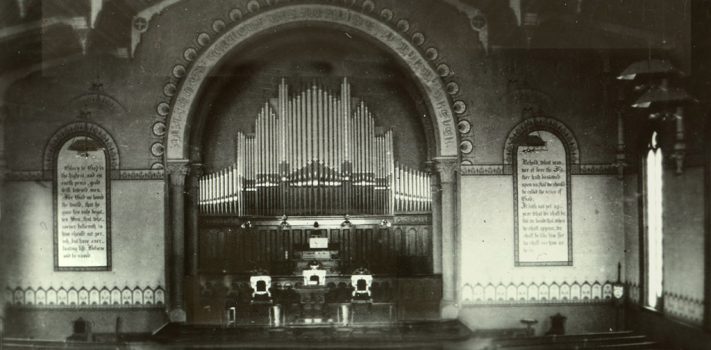While visiting a local church, I had an interesting experience, from a Safety/Security standpoint. My wife and I attended an organ recital at a church after they had installed a massive new pipe organ.
The organ was centrally placed with a massive lighting system set up around it to highlight it. The overhead lights lit up the entire area around the organ and additional lights (perhaps as many as 40 small lights) were set up underneath the organ to highlight the various pedals used by the organist.
The organist (well-accomplished and semi-famous) explained to the audience the history of the new organ and what she would be playing. She then proceeded to play a number of different pieces and would occasionally stop to talk about additional pieces she would play.
Fortunately, or unfortunately, depending on your perspective, I quickly became distracted. As the organist would play the organ, I noticed that all the lights in the church would get dim on occasion. Lights dimmed on 12 different occasions throughout the performance.
It occurred to me that there was likely an electrical short or a current overload in the wiring system set up for the new organ. And, I mentioned to my wife I need to call this to the attention of someone at the church. Note: she asked me not to raise the concern as it would delay our leaving.
As we were leaving, I saw a gentleman that appeared to be in charge. I pulled him aside and made him aware that all of the lights in the church were dimming at various times throughout the performance. And, I indicated this might be an electrical issue (a safety concern).
He then stated that he noticed that the lights dimmed when the organ was playing. However, he didn’t realize there could be a safety issue. He further stated he knew exactly who to tell and that the problem would be corrected. He did not offer to close the loop and tell me when the problem was corrected.
From a Safety and Security standpoint we often tell people that when they “See Something, They Need to Say Something“. As I thought about it, I realize there were several potential security/safety issues:
- The gentleman saw the light dimming but didn’t realize there was a potential safety concern.
- The organ had been played several times during the several regular Sunday services – and no one in the congregation had noticed the light dimming or they have not reported it.
This also helped me realize that sometimes individuals may become complacent. They sometimes fail to see things when they are in a place where they feel safe or comfortable.
I brought this topic up at a meeting of the Faith-Based Safety and Security Network of Hampton Roads. I thought it would be a good opportunity to discuss this incident and the potential impact on Safety and Security in Houses of Worship.
The attendees in the meeting agreed that people can sometimes be too complacent. Some of the potential ideas raised by the members were:
- It may be valuable to have a different set of eyes walk through their houses of worship. They realized that they may not “See “the areas of potential concern. Several members volunteered to visit other churches and provide an outside perspective. They offered to provide another set of eyes to look for problems.
- Additionally, several of the Safety and Security teams realized their team members needed to work at developing “eyes that see”.
- Part of the discussion also focused on maintenance within their facilities. Several members had no idea about the maintenance priorities at their facilities. All of the members realized that the Safety and Security teams should have the opportunity to review the priorities of the maintenance departments and have the authority to change the priorities (if safety and security are impacted)
Just as a side note, at the recent Uvalde, Texas school shootings the outside door to the school and the door to the classroom (where the students and teachers were killed) had broken locks. It is my understanding, that maintenance was not even scheduled to repair the broken locks as the broken locks had not been reported by the school administration.
Lastly, the Safety and Security team members focused on the fact that there was no follow-up from his church to let me know if the security issue was resolved. This presented a problem from the team member’s point of view:
- If I were one of the church members and I reported a safety concern and did not receive any feedback, would I be likely to report safety concerns in the future? The team members took the position that a failure to respond back to an individual, that had raised a safety concern, was highly likely to discourage any future reporting.
- A positive takeaway was that several of the team members in attendance decided that they would review their procedures for documenting and responding back to individuals that raised safety concerns.
Usually, when discussing safety and security issues we tend to focus on major events (disruption of the church, vandalism, theft, shootings, etc.). However, sometimes, even a relatively simple safety issue can provide us with an opportunity to learn and review our safety practices.
Robert E Downing, Ed.D.,
Director, Church Security Institute










